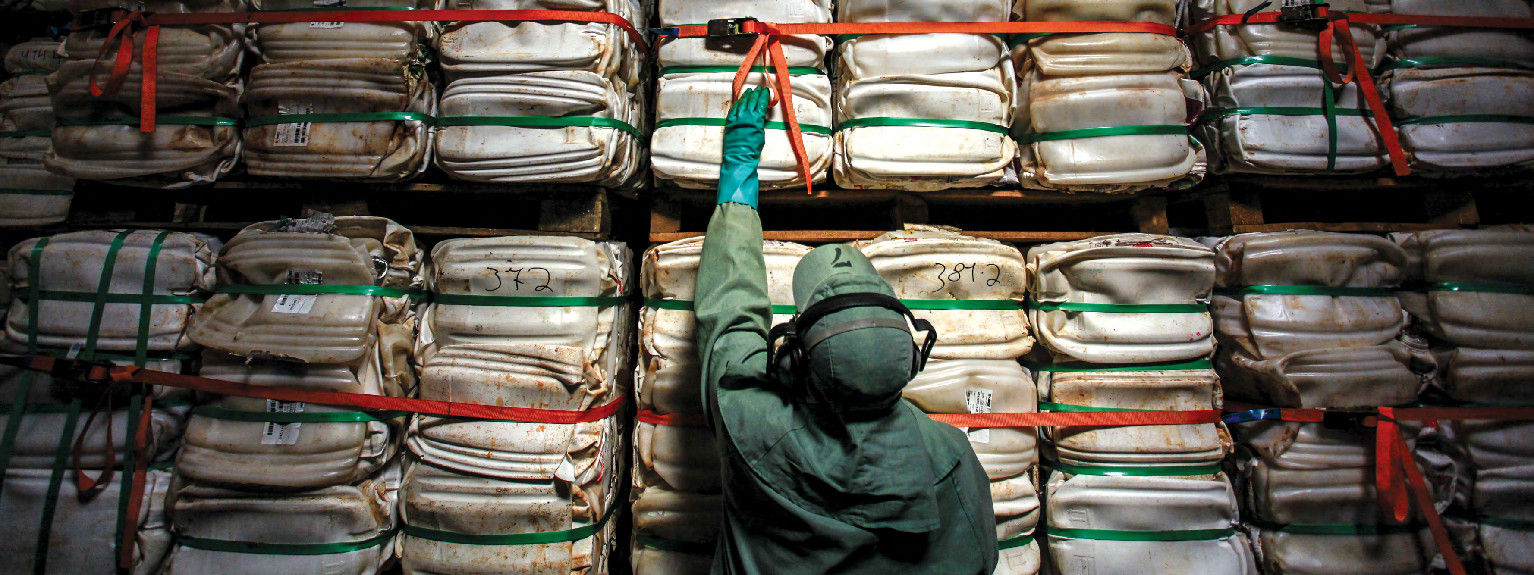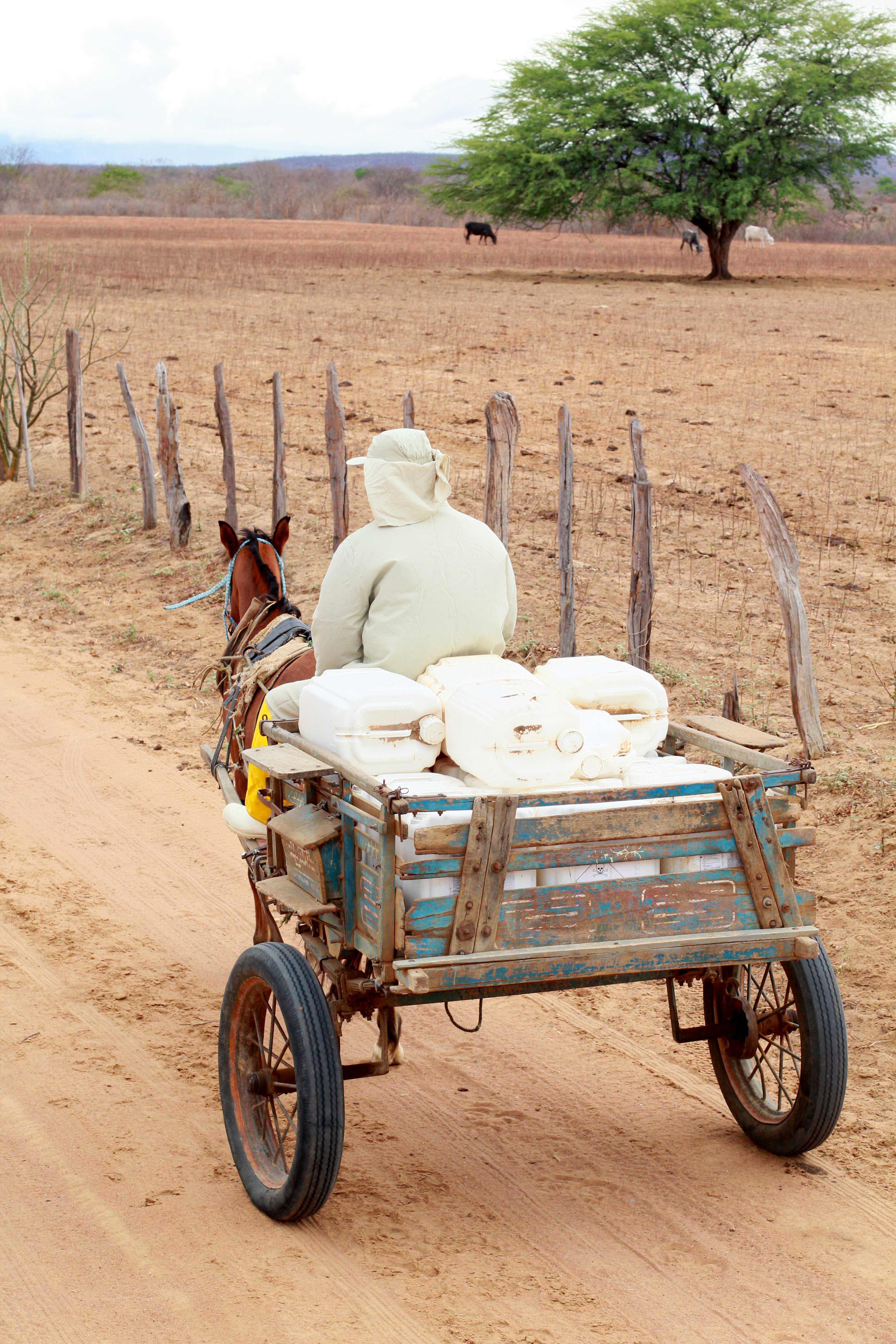
Packages are compacted and organized on pallets for shipping to their final destination
Economic-financial performance
Self-sufficiency: a quest to add value to the System
Created by the agro-chemical industry to fulfill the responsibility of the environmentally adequate disposal of empty crop protection packaging, inpEV has as its main source of funding the contributions of member companies. Accreditation fees of Campo Limpo System partnering recyclers, startup fees to cover receiving unit expenses and rent of the Campo Limpo Plastics Transformation Inc.
The financial management makes efforts to reduce costs and increase efficiency while also seeking to add value by means of the chain managed by the institute and by expanding its area of activity. Adding value to recycling is a form of capturing and reverting value to mitigate the System costs. Since 2008, the Campo Limpo Plastic Transformation and Recycling and more recently in 2015 the Campo Limpo Lids and Plastic Resins, act as partnering recyclers, by manufacturing and commercializing new crop protection packaging using recycled material from the System (read more about these companies on the here).
By building upon its acquired expertise, the institute also intends to expand the range of services, transforming the knowledge of the already developed team and infrastructure into value by providing consulting services (read more in the box below).
Project to receive leaf fertilizer packaging
At the end of 2016, inpEV and Abisolo (Brazilian Association of the Technology Industries in Plant Nutrition) signed a contract to carry out a pilot project for the reverse logistics of empty packages of foliar, organo-mineral and organic fertilizers, besides plant substrates and soil conditioners at some specific locations.
This pilot project will try to understand the return dynamics of packaging from this segment and identify the feasibility of its reverse logistics being done via the Campo Limpo System receiving units, using the existing know-how and infrastructure.
At that time, in 2002, we discussed a lot whether the law would 'catch on'. It was a new legislation that brought the concept of shared responsibilities, the role of each one, including farmers. It was hard work to develop awareness of all links. To make them understand that we were partners in a same chain. I recall that we celebrated a lot the 4,000 tons. Today we have already surpassed 410,000.
Regina Sousa, Administrative-Financial manager at inpEV since 2002
Added value statement (R$ x1,000) GRI G4-9 and G4-EC1
| 2014 | 2015 | 2016 | |
|---|---|---|---|
| 1. Revenue1 | 106,747 | 115,069 | 115,398 |
| 2. Inputs acquired from third parties | 89,601 | 94,266 | 94,786 |
| 3. Gross added value (1-2) | 17,145 | 20,802 | 20,611 |
| 4. Withholdings | 6,497 | 6,737 | 6,942 |
| 5. Net added value produced (3-4) | 10,647 | 14,064 | 13,669 |
| 6. Transferred added value received | 1,894 | 3,213 | 4,090 |
| 7. Total added value to be distributed (5 + 6)2 | 12,541 | 17,278 | 17,759 |
| Collaborators (wages, benefits and encumbrances) | 10,258 | 11,619 | 12,778 |
| Government (taxes, encumbrances and contributions) | 3,567 | 3,674 | 3,992 |
| Withheld profit/loss during the period | -1,676 | 1,577 | 588 |
| Remuneration of third-party capital (interest and leases) | 392 | 407 | 400 |
| Accumulated added value | 3,352 | -3,154 | -1,176 |
1 Includes the reversal of provisions, Cofins upon rental fees and non-operational expenditures.
2 inpEV is a private non-profit organization formed by a group of non-remunerated members. Therefore, there is no remuneration of shareholders.
System Investments
More than
1 billion R$
invested in 15 years

Main indicators
| 2014 | 2015 | 2016 | |
|---|---|---|---|
| Cost per kg (total) | |||
| Cost per kg (excluding the projects area) | |||
| inpEV budget (excluding the projects area, in millions of R$) | |||
| Total disposed packages | |||
| Total recycled packages | |||
| Total disposed packaging (Mono Hdpe in t) | * | ||
| Total disposed packages (of Coex in kg) | |||
| Media exposure (clippings) | |||
| Weight shipped per truck (in kg) |
Exceeded Performed
Performed, yet close to the limit (caution) Below estimated
* Climate factors, lower incidence of pests and delays in planting caused a divergence between the planned and performed volumes.
Economic-financial performance (R$ million)
| 2014 | 2015 | 2016 | |
|---|---|---|---|
| Total assets | 95 | 101 | 96.0 |
| Total resources that finance the program (inpEV + chain links) accumulated since 2002 | 801 | 910 | 1,006 |
| Operational revenue | 107 | 115 | 116 |
| Member contributions | 55 | 61 | 61 |
| Accreditation fee1 | 12 | 13 | 12 |
| Campo Limpo Property Lease2 | 6 | 6 | 7 |
| Net equity | 76 | 77 | 79 |
| Net indebtedness3 | 0.3 | 1 | 1 |
1 Paid by the recyclers for shipping packages and for technical cooperation with inpEV.
2 Rent paid by Campo Limpo Plastic Transformation and Recycling to inpEV.
3 Only obligations towards suppliers are considered, which exclude obligations towards central stations and outposts.
Tax and regulatory scenario
Keen on the interests of the agricultural chain, inpEV monitors the regulatory and institutional scenarios. One of the challenges is to get more favorable tax conditions for the reverse logistics program.
Regarding the Tax on the Circulation of Goods and Services (ICMS), inpEV has defended that these packages have already been taxed at their origin and there is no circulation of goods at the time of their return, but this argument was rejected by the National Finance Policy Council (Confaz), an agency of the Ministry of Finance. Therefore, inpEV continues to negotiate with each state based upon Agreement 51/99, which rules on the ICMS exemption benefit for the circulation of post-consumption packaging. In the current scenario, each state can decide to adopt or not this agreement.
In 2016, two new states, Santa Catarina and Roraima, agreed with the institute's reasoning and adhered to this Agreement. With this, 11 states have already sanctioned tax exemption regulations, including those that comprise a large part of its volume (Bahia, Mato Grosso and Mato Grosso do Sul).
In relation to Cofins, the institute also seeks to sensitize the IRS not to tax the recycler accreditation fees. The Institute receives from recycling companies a so-called accreditation fee relating to knowledge transfer relative to the process of using empty packaging derived from the agrochemical industry to create new artifacts, as well as training given to employees of these companies. These resources are reinvested into the System itself, in accordance with what the law requires from non-profit associations.
Due to the environmental benefit of the reverse logistics and recycling of empty packages, inpEV is also on the lookout for new mechanisms that may stimulate this market. The institute has kept track of proposals in the National Congress as a bill that seeks to exonerate final products that use recycled material in their composition.
Sustainability in the field: SCL helps preserve the environment by avoiding that empty packages are incorrectly disposed of

A rural producer of Catuti, state of Minas Gerais, returns empty packages during an itinerant collection event in the region